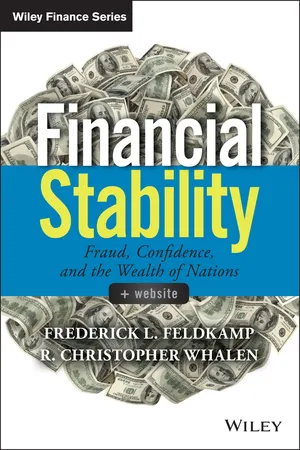
Financial Stability
Fraud, Confidence and the Wealth of Nations
- English
- ePUB (mobile friendly)
- Available on iOS & Android
Financial Stability
Fraud, Confidence and the Wealth of Nations
About this book
Applying the Lessons of History to Understanding Fraud Today and Tomorrow
Financial Stability provides a roadmap by which the world can anticipate and avoid future financial disruptions. This unique discussion of past and present financial events offers new insights that explain economic, political, and legal antecedents of financial crises in Western markets. With a detailed discussion of the history of finance, this book shows modern investors and finance professionals how to learn from past successes and failures to gauge future market threats.
Readers will gain new insight into the antecedents of todays financial markets and the political economy that surrounds them. Armed with this knowledge, they will be able to craft a strategy that steers away from financial disorder and toward maximum stability. Coverage includes discussion of capital, forecasting, and political reaction, and past, present, and future applications within all realms of business. The companion website offers additional data and research, providing a complete resource for those seeking a better understanding of the risk at hand.
As the world struggles to emerge from the latest financial crisis, professionals in finance, the law and other disciplines, and the people they advise, are searching for understanding to avoid future crises. Financial Stability argues that the best lessons are learned from our own mistakes, and that the ability to look ahead depends upon our willingness to look back. Readers will:
- Review the historical laws, practices, and outcomes that shaped the modern day financial markets of the great western economies
- Understand the theory of financial stability, the roles of law and transparency, and the importance of action to punish fraud in order to prevent future contagion
- Work through the theoretical proofs in terms of math, law, accounting, economics, philosophy, and international trade
- Build a strategy for the future with consideration toward needs, sources, balance, and learning from past mistakes
Everywhere around the globe, at all points in history, financial crises have always been rooted in the confluence of politics, finance, and law. Financial Stability puts the latest global financial crisis in perspective, highlighting the lessons we have already learned, and those we need to internalize today.
Frequently asked questions
- Essential is ideal for learners and professionals who enjoy exploring a wide range of subjects. Access the Essential Library with 800,000+ trusted titles and best-sellers across business, personal growth, and the humanities. Includes unlimited reading time and Standard Read Aloud voice.
- Complete: Perfect for advanced learners and researchers needing full, unrestricted access. Unlock 1.4M+ books across hundreds of subjects, including academic and specialized titles. The Complete Plan also includes advanced features like Premium Read Aloud and Research Assistant.
Please note we cannot support devices running on iOS 13 and Android 7 or earlier. Learn more about using the app.
Information
PART One
A Flight through Financial Market History—Freedom and Fraud
CHAPTER 1
The First Few Millennia
CHAPTER 2
The Bank of England and the Scottish Enlightenment
Table of contents
- Cover
- Series
- Titlepage
- Copyright
- Dedication
- Chronology
- Preface
- Introduction
- PART ONE A Flight through Financial Market History—Freedom and Fraud
- PART TWO The Theory of Financial Stability
- PART THREE Proofs of the Theory of Financial Stability
- PART FOUR The Future
- Epilogue Truth and Consequences
- Appendix Six Legal Isolation Requirements
- References
- About the Companion Website
- About the Authors
- Index
- End User License Agreement